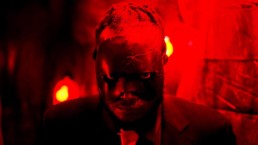SXSW: ‘Bitch Ass’: A Slasher Horror From the Hood
Winner of SXSW's Midnighters section.
With its forwardly foul-mouthed title alone, Bitch Ass certainly makes a stark first impression. That same confrontational quality carries through in writer-director Bill Posley’s self-assured film. Certainly, it exudes bold, confident energy from beginning to end. Ultimately though, Bitch Ass‘s templated writing, low production value, and lack of distinct directorial vision limit it to only being a low-entertainment slasher film.
It’s not for a lack of having ambitious inspirations that Bitch Ass doesn’t succeed. Opening with a Vincent Price-like narrator who quite literally references famous Black slasher films like Bones, The Bone Collector, and People Under the Stairs, we can assume that director Bill Posley (who also wrote the film with Jonathan Colomb) reveres the genre he’s working in. But as Bitch Ass continues, it’s pretty clear that those references are more aspirational than earned.
The story follows a group of high schoolers who, at the instruction of gang leader Spade ( ) on “666 night” (just a scary-sounding name), break into the house of a deceased woman to rob it. Little do they know, the youths have stumbled into the house of “Bitch Ass,” a once-bullied high schooler who has transformed from a victim–with a love of board games–into a sadistic serial killer, who challenges his prey to elaborately-staged games to the death.
It’s not hard to imagine how Jigsaw’s infamous “Do you want to play a game?” line may have provided the entire grounds for this story. As the kids enter the house and subsequently get picked off (is everyone really unable to hear each other’s blood-curling screams from within this suburban two-story house in the middle of the night?), they each become victims for these games, that wink at names like “Operation” and “Battleship” by re-naming their grizzly counterparts as “Surgeon” and “Mayday.”
Bitch Ass is at its most unique and entertaining when we are in the moments of these games. The film quite literally goes into a “versus mode,” entering different styles of split screens in which to capture the screaming faces and scenes. But these moments are also pretty cringingly staged, which only exposes the film’s silliness rather than scariness. At its best, it’s a fun campy experience but at its worst, it’s like walking through a cheap haunted house.
If I could ask director Bill Posley a question, it’d be why he never changes the lens on any shot within any scene. Every shot is noticeably ultra-wide, which makes for an odd watch and also compresses the film into one emotional note, making it feel flat and poorly designed. The film could have been heightened even more if we saw varied shots so as to get different experiences within the characters and storytelling.
Even though Bill Posley’s execution might not be all the way there, he does offer a lot in terms of creativity and ideas. He aspires to weave together a slasher story while also flashing back to making an origin story of the high schooler who was bullied. He is routinely called “Bitch Ass” by the bullies who torment him, to which the film gets its exciting name; but I think a title that’s more board game-related (Don’t Pass Go?) would better characterize this movie.
If you’re looking to watch a campy slasher movie, or if you’re curious to see a version of Saw that is quite literally based on kid’s board games, you may enjoy the cheap thrills that Bitch Ass offers. While I didn’t find that it transcended its low-budget limitations to become anything more, there’s a level of inventive storytelling and raw power that makes Bitch Ass a defiantly unique movie.
Ryan Rojas
Ryan is the editorial manager of Cinemacy, which he co-runs with his older sister, Morgan. Ryan is a member of the Hollywood Critics Association. Ryan's favorite films include 2001: A Space Odyssey, The Social Network, and The Master.

